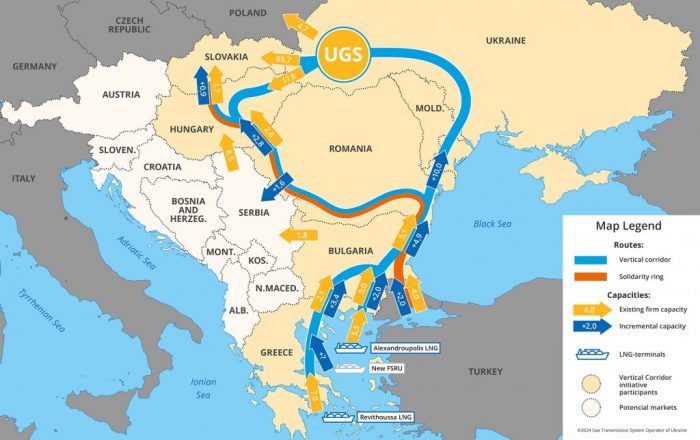GTS operators of Central and Southeast European countries presented the next phase of the Vertical Corridor initiative: the binding stage of the incremental capacity allocation between the participant countries’ gas transmission systems. The meeting was organized by DESFA, Greek GTS operator.
The binding stage of the incremental capacity allocation at respective GTS interconnection points will start in July 2024. Representatives of participant companies, including DESFA and Gastrade (Greece), ICGB and BULGARTRANSGAZ (Bulgaria), TRANSGAZ (Romania), FGSZ (Hungary), EUSTREAM (Slovakia), VMTG (Moldova) and GTSOU (Ukraine), have confirmed their readiness to simultaneously implement this commitment, in accordance with the EU’s NC CAM Regulation adopted by the European Commission.
“The GTS Operator of Ukraine, together with all its colleagues within the Vertical Corridor initiative, will hold binding auctions of the incremental capacity in July 2024. An important detail: thanks to the coordinated efforts and proactivity displayed by all participants, we are one year ahead of the standard procedure’s schedule. I hope that our coordination will remain this effective and together we shall implement the Vertical Corridor project for the benefit of Europe’s energy security,” GTSOU’s General Director Dmytro Lyppa noted during his speech.
During the meeting, representatives of each GTS operator informed potential customers about the peculiarities of the incremental capacity allocation procedure, since the rules and conditions for incremental capacity booking may differ at different interconnection points depending on local regulations.
Based on the results of the auctions, GTS operators will prepare an economic test that will be based on the incremental capacity allocation. Operators will determine the most economically feasible options for capacity expansion, the implementation of which is necessary to meet demand along the Vertical Corridor.
Let it be reminded that the Vertical Corridor initiative offers diversification of natural gas supply sources in the European market due to the new LNG FSRUs in Southern Europe, as well as to gas transportation from south to north through the existing European transmission network. Apart from that, the project’s potential can be expanded through the use of the mentioned infrastructure for the transportation of renewable gases.
